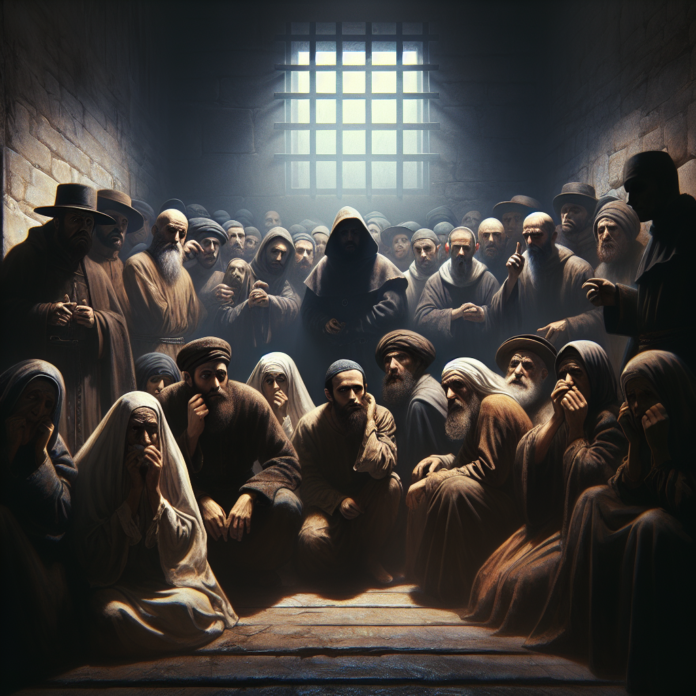The Spanish Inquisition and the Persecution of Jews and Muslims: A Dark Chapter in History
At the turn of the 15th century, Spain was a land of contrasting realities—a hub of cultural prosperity and intellectual vibrancy, contrasted with an undercurrent of suspicion, prejudice, and religious zealotry. The Spanish Inquisition stands as a glaring testament to how the thirst for homogeneity and control can lead to an epoch of unfathomable cruelty. Under the guise of religious purification, the Inquisition targeted thousands of Jews, Muslims, and even converts to Christianity, inflicting centuries of hardship and suffering. In the broader narrative of human history, the Spanish Inquisition’s persecution of Jews and Muslims is a stark reminder of the dangers that arise when traditionalist dogma eclipses humanism and inclusivity.
Initiated in 1478 by Catholic Monarchs Ferdinand II of Aragon and Isabella I of Castile with the approval of Pope Sixtus IV, the Spanish Inquisition had a myriad of covert and overt objectives. Officially, it aimed to root out heresy among newly converted Christians, while covertly it consolidated power, centralized authority, and engendered an unnerving uniformity in Spanish society. The intellectual curiosity and cultural confluence that had defined Spain, especially under Muslim rule during the Golden Age of Al-Andalus, now became suspect and even criminal.
Jews and Muslims formed essential parts of the Spanish social fabric for centuries. Al-Andalus, under Muslim rule from the 8th to the 15th century, had been a melting pot of cultures and religions, where Jews, Christians, and Muslims coexisted and even thrived together. However, with the Reconquista culminating in the fall of Granada in 1492, the status quo dramatically shifted. Ferdinand and Isabella decreed the Alhambra Decree, ordering the expulsion of Jews who refused to convert to Christianity, thus planting seeds of systematic persecution.
For the converted Jews and Muslims, known respectively as Conversos and Moriscos, life under the Inquisition was a tragic irony. Conversion was not a sanctuary but a perpetual state of suspicion. Conversos were accused of judaising, or secretly adhering to Jewish practices, while Moriscos faced allegations of crypto-Islam. These charges, often based on little more than hearsay or personal grudges, resulted in inquisitions marked not by truth-seeking but by torture, public shaming, and executions.
The mechanisms of the Inquisition were as draconian as they were iniquitous. Secret denunciations were routine, trials were hidden from public view, and the accused were often denied basic rights, such as knowing their accusers or the nature of the evidence against them. Adhering to tradition in one’s private life became tantamount to a death sentence. Torture methods such as the strappado (where the victim was hoisted by their arms and then suddenly dropped) and the rack (stretching limbs to excruciating lengths) were routinely employed to extract confessions.
The Inquisition’s destruction was not limited to psychic and physical torment; it also engulfed cultural and intellectual life. The expulsion and forced conversion of Jews and Muslims led to an incalculable loss in fields as diverse as medicine, literature, and philosophy. Antonio de Nebrija, a prominent humanist and scholar, recognized this broader context in his 1492 work, "Gramática de la lengua castellana," lamenting that Spain’s new dominance seemed to coincide ominously with a narrowing of intellectual horizons. The symbiosis of Jewish, Muslim, and Christian thought had fostered a form of early Renaissance in Spain that was now being snuffed out in favor of contrived uniformity.
Moreover, the economic repercussions were significant. Jewish and Muslim communities had been crucial to trade, agriculture, and financial sectors. Their expulsion left a vacuum that was not easily filled, leading to economic stagnation in some regions. This stunting of growth underscores how regressive policies, cloaked in tradition and orthodoxy, can stifle not only cultural and intellectual dynamism but also economic progress.
Contrast these historical forces with the values that modern, inclusive societies uphold. Humanism, characterized by an emphasis on individual rights, mutual respect, and intellectual freedom, stands in glaring opposition to the repressive traditionalism of the Inquisition. The Enlightenment, only a few centuries later, championed these progressive values and contributed to the end of institutionalized inquisitions. It became increasingly apparent that a society that persecutes its intellectuals, artists, and scientists—simply for their beliefs or heritage—impedes its own progress and prosperity.
In contemporary discourse, the Spanish Inquisition serves as a poignant exemplar of the perils of rigid traditionalism and the fight for a more inclusive, progressive society. Racism, xenophobia, and religious intolerance, although taking different forms, remain current issues. The lessons from this dark chapter of history suggest that societal strength lies in diversity, mutual respect, and an unwavering commitment to human rights.
The Spanish Inquisition was not merely an anomaly but a clarion call to the underlying dangers of dogmatism and exclusion. It is crucial to remember, reflect, and, most importantly, learn from this epoch to build societies that prize diversity, intellectual freedom, and human dignity above the myopic and often destructive dictates of rigid traditionalism.
